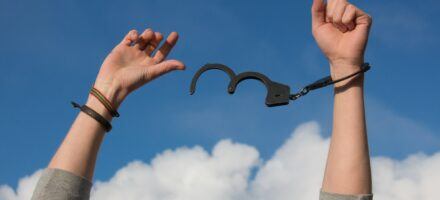Reading Time: 4 minutes
As part of your recovery from pornography, it's important to talk about what you're going through with people you feel safe with. And I mean it when I say safe. Not just any rando you say "Hi" to in the break room. This should be a counselor, your partner, your bishop/pastor, best friend, or close sibling. It could be in a group that's led by a counselor, or a recovery-centered chat room.
Before you open up, ask yourself if this person or people are safe to share with. You may want to sit with the question for a few days first so you can be sure. You'll know the answer. Trust yourself, and share your experience. You'll be better off for it, and here's why.
1. It brings you out of isolation, where addiction thrives.
According to the
addiction center:
"Isolation is one of the main antagonists against recovery... The first step in confronting addiction is coming out of hiding and accepting the help and love from not only others, but from ourselves."
I know, I know. It's a lot safer and easier to avoid being real with people. I can probably guess your internal monologue. "
Yeah, okay, easier said than done. Open up and see that judgy look on their faces? Psh."
But the uncomfortable reality is, we
need to feel seen. Even on our deepest, darkest levels, if we're to grow to our full potential. When we become vulnerable and let others in, darkness has a way of dissipating. Human beings are hard-wired to need genuine connection in order to thrive. On the flip side, we kinda start to wither away without it.
It's risky, sure. But with the right people, it's more than worth it.
2. You're releasing emotional weight.
This stuff can get heavy, weighing you down throughout your day. Even if you aren't consciously thinking about the changes you know you need to make or the relationships you're fighting to keep, having it in the back of your mind can affect the way you interact with the world.
It's an important release, and it feels good to drop some of your thoughts and feelings off with a trusted friend. After sharing something heavy and it's met with kindness, it can feel like one of the big suitcases you've been dragging around just disappears.
3. Talking helps work a problem out.
Brooding can only do so much. It all gets tangled up in over-analysis land. Demystify it.
Through conversation, something that seemed like an insurmountable obstacle can move into the right light and suddenly look small and approachable.
I'm a huge culprit of over-thinking, and I tend towards pessimism, too. It feels like a safeguard against something bad happening. One of my mantras is a quote I read on a chamomile tea bag: "The difference between a weed and a flower is a judgment." Often, the only way to get to the flower is by running one of my piles of mental weeds by one of my safe people. Little by little, we can start working through it.
Even if you don't come up with a solution, it's amazing the simplicity that an outsider's perspective can bring.
4. You won't know what resources are out there unless you mention what you need.
The people you already know probably have more helpful ideas and connections than you realize; and they're not going to volunteer them unless they know there's a need. Start talking about what you're up to, and blammo--someone often has a connection over here, or a light bulb over there.
You probably know the basics of networking already. Think of this as using your personal network, not for career growth, but for personal growth.
For example, you might mention to Phil on Tuesday that you've been looking for new interests as part of your recovery, and by Saturday you might be clinging to the edge of a cliff and praying that you'll see your next birthday while Stew (Phil's rock-climbing brother) yells, "You're doing great!"
5. Full confessions feel good and help us grow.
It's tempting to underplay or completely hide our experiences during recovery because we're ashamed and we fear judgment or worse. But with safe people, it helps to give full confessions, not half-confessions, which can actually make us feel worse than not confessing at all. We tend to believe that full confessions of the very thing we fear will bring ridicule. But being completely honest seems to release this fear, especially if it's met with compassion.
Additionally, becoming more honest has been shown to improve mental and physical health. This may be because it takes a lot more energy to hide than it does to be transparent, and we all know it makes us feel better about ourselves.
6. Your openness opens up other people.
Think about it. If a friend bravely admits a failure or shares a secret with you, don't you automatically feel safer doing the same thing?
In fact, if I see someone strong enough to tell me something that risks me judging them, I find myself searching my mind for something I can share that will make them feel better. "Oh, no, no, no. You're not the only weirdo here, trust me. Get a load of what I did at the last family reunion."
This kind of mutual openness may seem uncomfortable for a moment, but it sets us up for mutual success in the long run.
Furthermore, you're creating the kind of community you need in order to thrive.
We've all heard that we become the people we surround ourselves with, but we don't often wonder what kind of people
we are for the people
we're surrounding. By being vulnerable and honest, you're setting a good example. Openness breeds openness, accountability breeds accountability. Be the change you wish to see in your home, your family, and your community.
7. Sharing reduces shame, which was most likely where this whole problem started.
Shame is often at the root of addictions. It's such an intense negative emotion that we want to numb it, forget it, drown it out with weak bursts of feel-good chemicals. But it's still there, building as the problem builds.
The good news about shame is, it loses its power with exposure. It's basically a vampire (a real one, not a Twilight one) that feeds in darkness and then burns up in the sun. By revealing a little of your shame to someone, you put a little vampire out in the sun. It takes immense courage, but the payoff is... fewer vampires, so to speak.
It takes courage to admit what we're actually going through rather than pretending that everything's fine.
The rewards can be great, so it's worth it to try. If all you have to lose is your dignity, maybe ask yourself what your dignity ever did for you, really. I think you'll find that it's not all it's cracked up to be.



[…] awhile for you to find a person who you know will love and support you no matter what. Remember that talking through your recovery is important. In time, those feelings of shame will slowly begin to melt away. We all make mistakes, […]